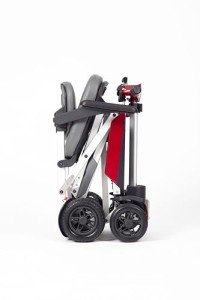10 Healthy Habits For A Healthy Lightweight Mobility Scooters
Lightweight Mobility Scooters: A Comprehensive Guide
As the world embraces a more inclusive environment for individuals with mobility obstacles, lightweight mobility scooters have emerged as essential tools to enhance independence and mobility. Developed for ease of use, mobility, and an user-friendly experience, these scooters offer a useful option for those who want to browse their surroundings with minimal trouble. In this post, we will explore the features, advantages, and considerations associated with picking the right lightweight mobility scooter.
What Are Lightweight Mobility Scooters?
Lightweight mobility scooters are compact and easily portable electric scooters developed for individuals with restricted mobility. They are typically made from lightweight products such as aluminum and are engineered for ease of disassembly, enabling users to take them on public transport or store them in small spaces. These scooters use a practical option for running errands, taking part in recreational activities, or just delighting in a day out.
Key Features of Lightweight Mobility Scooters
Function
Description
Weight
Generally weighs in between 30-125 lbs (14-57 kg)
Speed
Maximum speed ranges from 4-8 miles per hour (6-13 km/h)
Range
Travel distance normally in between 10-15 miles (16-24 km) per charge
Turning Radius
Compact turning radius, normally varying from 32-54 inches (81-137 cm)
Battery Type
Usually uses lead-acid or lithium-ion batteries
Seat Options
Swivel and adjustable seat height for comfort
Portability
Developed for easy disassembly and transportation
Weight Capacity
Varies, usually as much as 300-400 lbs (136-181 kg)
Accessories
Optional accessories like baskets, lights, or canopies
Advantages of Using Lightweight Mobility Scooters
Boosted Mobility: Lightweight mobility scooters empower users to move individually, accessing stores, parks, and leisure locations with ease.
Mobility: The capability to disassemble the scooter or fold it makes it easy to transport in cars or public transportation.
User-Friendly Design: Most scooters come with intuitive controls, making them accessible for individuals of various ages and mobility levels.
Affordable: Compared to bigger, durable scooters, lightweight alternatives are often more budget-friendly, making them an appealing option for numerous users.
Convenience: Many designs have adjustable seating and ergonomic styles to improve comfort throughout rides.
Picking the Right Lightweight Mobility Scooter
When thinking about the purchase of a lightweight mobility scooter, a number of elements require to be evaluated. Below is a list of considerations to keep in mind:
Weight and Portability: Evaluate how easy it is to take apart or fold the scooter for transportation and inspect the weight to ensure you can lift it if necessary.
Range and Battery Life: Consider how far you plan to travel on a single charge and select a scooter that fulfills your daily needs.
Weight Capacity: Select a scooter that conveniently supports your weight, guaranteeing stability and resilience.
Comfort and Features: Look for functions like adjustable seating, footrests, and armrests to make sure a comfy experience.
Surface Compatibility: Depending on where you plan to utilize the scooter, think about designs created for rugged terrains or mostly for smooth pavements.
Safety Features: Ensure there are vital security features such as lights, reflectors, and a horn to alert pedestrians.
Popular Lightweight Mobility Scooter Models
Design Name
Weight
Speed
Variety
Weight Limit
Features
Drive Medical Scout
115 lbs
4.25 miles per hour
15 miles
300 pounds
Swivel seat, adjustable armrests, dismantles quickly
Cherokee Mobile
80 lbs
4 miles per hour
10-12 miles
250 pounds
Easy to fold, lightweight, compact style
EV Rider Mini Rider
90 pounds
5 miles per hour
15 miles
300 lbs
Compact style, adjustable tiller, spacious footrest
Pride Go-Go Elite Traveler
123 lbs
4.5 miles per hour
12.5 miles
300 pounds
4-wheel design, easy disassembly, comfy seat
Upkeep and Care for Lightweight Mobility Scooters
To extend the life of a mobility scooter and preserve its efficiency, follow these upkeep tips:
Regular Cleaning: Keep the scooter tidy by cleaning it down frequently and avoiding exposure to water.
Battery Care: Check the battery monthly for proper charge and clean the terminals to prevent rust.
Tire Maintenance: Inspect tire pressure and tread frequently to ensure a safe trip.
Inspections: Schedule routine evaluations by a licensed service technician for advanced checking of electrical parts.
FAQ Section
1. Are lightweight mobility scooters suitable for outdoor usage?
Yes, numerous lightweight mobility scooters are designed for outdoor use, but it's vital to inspect the producer's specifications for terrain compatibility.
2. Just how much do lightweight mobility scooters cost?
Rates vary based upon functions and requirements, normally ranging from ₤ 700 to ₤ 2,500.
3. Does Medicare cover mobility scooters?
Medicare may cover the expense of a mobility scooter under particular conditions. It's best to seek advice from your doctor and Medicare for particular coverage information.
4. Can I take my mobility scooter on a plane?
The majority of airlines allow mobility scooters as checked baggage; nevertheless, talk to the specific airline for their guidelines and treatments.
5. For how long does the battery last on a lightweight mobility scooter?
A completely charged battery typically lasts anywhere from 10 to 15 miles, depending on the scooter model and user weight.
Lightweight mobility scooters act as a beacon of self-reliance for those with mobility restrictions. With a variety of models readily available, it's essential to pick one that satisfies your specific requirements and choices. By understanding the features and advantages, users can feel empowered to make informed choices, improving their mobility and lifestyle. As additional resources continues to innovate, the future of lightweight mobility scooters is set to become much more user-friendly and encouraging of active way of lives.
